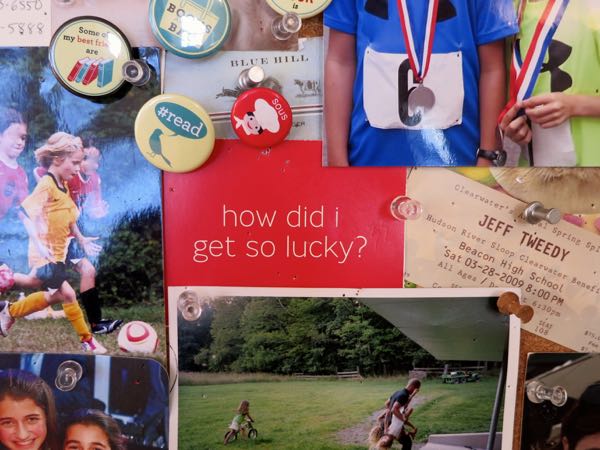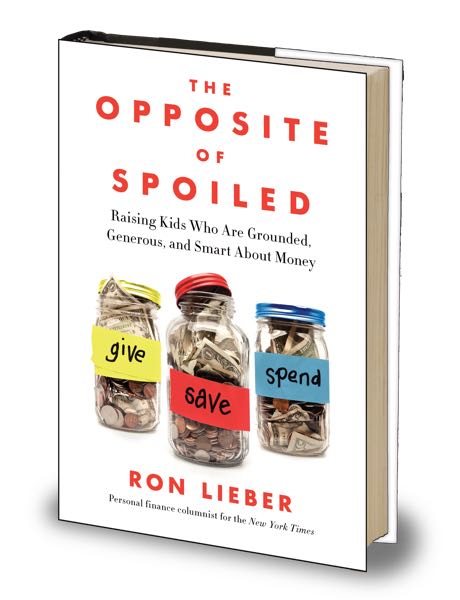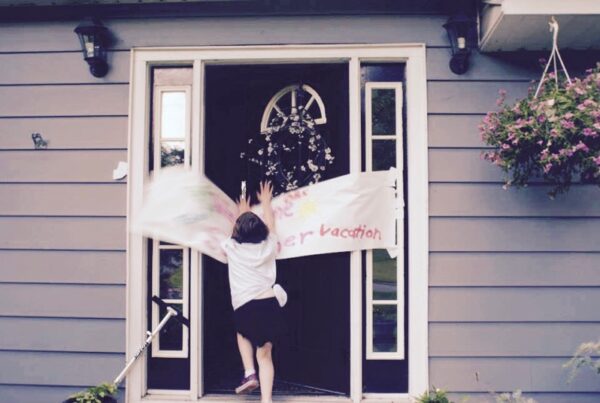
I feel kind of bad for my kids that I just read The Opposite of Spoiled. Have you guys heard about this book? It’s written by Ron Lieber, New York Times personal finance columnist (and onetime DALS contributor, you may recall) and I fear it’s going to be one of those books that informs every conversation I have with them, around the dinner table and otherwise. Like yesterday, when I was in the car discussing whether the upcoming birthday girl wanted an experience (dinner at a local restaurant, say) versus a thing (Battlestar Gallactica Boxed Set, maybe) for a gift this year. And when dinner was ready but the table was decidedly not set, even though it has been very clearly communicated that the administering of allowance is in direct correlation to the regular completion of this task. Or when I went on and on about why I was shelling out the extra bucks for the organic chicken versus the non-organic one, even though I’m not entirely sure they were paying attention in the first place.
They were. Those rascally kids. They see everything! Once you start to look, money-related teaching moments abound and, according to Lieber, should be mindfully embraced. Not only because, yes, they’re watching our every move, modeling their financial behavior off ours, but because they are growing up in more challenging conditions than any generation before us. Among other things, at seemingly every turn, our children are relentlessly bombarded by marketers (not only at the grocery store!) telling them to Buy! Buy! Buy! They are surrounded by social media that reinforces this acquisitive culture, creating a “vast vista of jealousy and one-upmanship;” And, most important, many will be facing astronomical college bills (read: debts) that they’ll likely carry into adulthood.
It’s not all scary though. I think Lieber’s book has been following me around all week because at its heart, it’s not alarmist. And it’s not about how much allowance to give your kids, or what the going rate for the tooth fairy is, or parsing out “wants” versus “needs” – though all of those fundamentals are certainly addressed. What I liked most was how it frames money as a tool to enrich parenting — and, by extension childhoods. In this context, teaching kids about saving is really teaching them about delayed gratification (a dying phenomenon, and a topic you know I’m obsessed with); a visit from the tooth fairy is not just another mindless wallet dive, it’s an opportunity to implement a meaningful ritual, like one family Lieber profiles, who leave an international coin under their kids’ pillows, to reinforce the family’s commitment to “imagining other places.” There’s also the family that gives their kids “skip-the-vegetable” and “drop-everything-and-play-
Lieber has collected many stories like these from communities and families across the country and across all income brackets. All of them are addressing the same questions parents the world over ask themselves every day: What do our choices say about our priorities as a family? What do we value most as a family? Are we raising children who are grateful for what they have? Not just the piano lessons and the Nike Free Runs, but their family, friends, and communities? In my book, that’s the biggest one. In fact, I’m thinking of adding another little reminder card to my bulletin board up there, one I also stole from a family in Spoiled: “If you want to feel rich, just count all the gifts you have that money can’t buy.”
Related: “Why You Should Tell Your Children How Much Money They Make,” an excerpt from The Opposite of Spoiled: Raising Kids Who are Grounded, Generous, and Smart About Money.
What are your most persistent conundrums about kids and money? Lieber said he’d be happy to answer any questions posed in the comment field below.






This book has my on my list for a while now, but it just shot to the top of the list!
Delayed gratification, yes! Also, I expected my kids to show gratitude for the meal I cooked with care and love every single night by eating it all up! And they did.
Thank you! I’d heard of this book but not yet read it. I’m ordering it right now. We have a 7 year old and struggle daily with how to make him appreciate what he has and the value of money. He’s growing up wanting for nothing, which was neither his father’s nor my own experience. We feel like failures on this measure regularly!
Thanks so much for sharing! I’m putting this on my Kindle NOW. 🙂
Looks like a great read! My husband was just talking about how his parents never talked with him about money – even when he would ask – and he felt disadvantaged by it.
I hope it will indeed inspire discussions, and not just around dinner tables. It’s been so overwhelming to see commercialization of every single aspect of life. Valentine’s Day is approaching, with the pressure to show love via an obligatory gift. Kids are sponges, copy-cats, their attitude to money always mirrors what they observe. Look forward to reading the book!
Would love to hear thoughts/ways on how to combat the feelings of comparison to other kids/friends/peers peers that are either close friends or just class’s mates – eg. Someone else’s house/car/clothes etc are better. Someone else gets to go on more exciting holidays/ do more classes etc etc. Particularly interested in how you might stop or prevent kids from making these comparisons even when other kids are saying it flat out rather directly, and when kids might have inner feelings of shame or jealousy despite best efforts to explain that’s not the important stuff in life
Thank you!
Sometimes I want to have these discussions with my husband 🙂 We actually do, but more consistently.
Thanks for sharing this book – it wasn’t on my radar at all and now it’s on my “must read” list. I’d love to hear the author’s thoughts on how involved to get with how kids spend their money. We used to budget a certain amount for kid expenses. Now that our oldest is almost a teen, we opted to instead give her that chunk of money. In turn, she must budget for school lunches, activities out with friends, clothing, etc. She does a good job making sure she’s covered the necessities, but blows the rest of the money on whatever catches her whim at the moment (namely Taco Bell and band t-shirts). It seems counterintuitive to say, “Here’s your money to spend as you see fit” but then harp on her that perhaps she’s not making the best choices with her money. We’re especially interested in how to encourage kids to save for future bigger expenses, like a first car or a cell phone. Thoughts?
I just ordered it–I had never heard of it, but it sounds like exactly what I’ve been looking for! We’ve been talking a lot about how much things cost lately because I want my kids to understand that everything costs money and even seemingly little things (going out to ice cream, getting a haircut) is an expenditure and something they should be grateful for. It’s been interesting asking them what they think certain things cost and how far off base they are.
You might also want to read “Longing and Belonging”, by Allison Pugh. It’ll likely be a nice companion to this book, more along the lines of why children (both affluent and lower-income) want what they want, why parents either resist or give in, and the emotionality surrounding it all. Highly recommended, and I’m looking forward to reading this as well 🙂
Hi Jenny,
This isn’t on topic but I was just looking for your sloppy joes recipe and the page seems to be down. Could you please repost?
Thanks!
When my kids were little, I would always tell them we were “rich in love”. At some point it sunk in b/c our babysitter said she hoped she won the lottery and my son, about 7, said “why? don’t you have everything you need?”
My kids are now 15 and 12 and they think the “rich in love” comment is totally corny, but it worked when they were little!
I’ve also used “Well, I feel rich if I can buy everything we need and I have a little left over for a book.”
Thank you for the tip. We started giving our almost 6 year old an allowance that is mapped to him helping with simple chores, like emptying his lunch bag after school, hanging his coat, making his bed on the weekend. He has been for the past 6 weeks saving his allowance to buy a castle Lego set. Tonight, we were talking about birthday gifts and how the other big castle set he is getting for his birthday is expensive and he needs to take good care of it when he builds it, he said “mommy, I don’t want you to use all the money you saved in the bank for my gift, use the money I saved, I don’t need two sets” 🙂 it warmed my heart to hear him say so. I was raised in a family that had very little financial responsibility and It rubbed on me. I’m determined to do better with my son and help him prepare for all the challenges you mentioned.
Great questions everyone — just wanted to let you know that Ron will chime in with answers in the next few days. Thanks guys!
I’m curious about allowance, and whether it should be linked to chores. I don’t really like my child to have the idea that she’s being compensated for doing basic things like feeding the dog and setting the table. But I also feel strange handing her money with nothing required on her part. Is it a good idea to connect chores and money?
I am having this same issue about chores and allowance. It is hard to justify paying her for doing things that she is expected to do anyway. But at the same time I don’t just want to hand her money. I will be reading this book soon. The excerpt was great.
Same question re chores and allowance. Should they be tied together? I didn’t get allowance growing up and was expected to pitch in. We had a big family and a limited budget and so we were all expected to do our part. I want to cultivate that same feeling with our kids and don’t want them to think that they should be paid for everything they are asked to do. At the same time, giving an allowance and perhaps the responsibility that teaches, seems like a good idea.
Looking forward to reading this, and wonder if he has an opinion on cash allowance vs digital/ register tally.
We gave cash (same $ amount as their school yr) because we wanted them to practice counting money and have a tangible idea of their savings.
The problem is my husband and I rarely use cash, and it is a pain to have it for allowance. I’m debating going to a digital tally, but wonder if we’ll lose some of the benefits/lessons.
I don’t have a question, but another thought on the tooth fairy. Love the family that gives international coins. My husband collects coins as a hobby, so we give the gold-color dollar coins to the kids for the tooth fairy. It’s a way to get their own coin collections started. Sounds like a great book